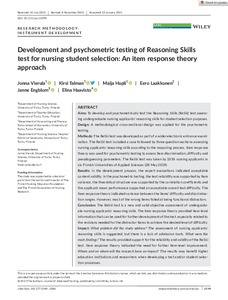Development and psychometric testing of Reasoning Skills test for nursing student selection: An item response theory approach
Vierula Jonna; Talman Kirsi; Hupli Maija; Laakkonen Eero; Engblom Janne; Haavisto Elina
Development and psychometric testing of Reasoning Skills test for nursing student selection: An item response theory approach
Vierula Jonna
Talman Kirsi
Hupli Maija
Laakkonen Eero
Engblom Janne
Haavisto Elina
Wiley
Julkaisun pysyvä osoite on:
https://urn.fi/URN:NBN:fi-fe2021042827265
https://urn.fi/URN:NBN:fi-fe2021042827265
Tiivistelmä
Aims To develop and psychometrically test the Reasoning Skills (ReSki) test assessing undergraduate nursing applicants' reasoning skills for student selection purposes.
Design A methodological cross-sectional design was applied for the psychometric testing.
Methods The ReSki test was developed as part of a wider electronic entrance examination. The ReSki test included a case followed by three question sections assessing nursing applicants' reasoning skills according to the reasoning process. Item response theory was used for psychometric testing to assess item discrimination, difficulty and pseudoguessing parameters. The ReSki test was taken by 1056 nursing applicants in six Finnish Universities of Applied Sciences (28 May 2019).
Results In the development process, the expert evaluations indicated acceptable content validity. In the psychometric testing, the test reliability was supported by item variance, the theoretical structure was supported by the correlation coefficients and the applicant mean performance supported an acceptable overall test difficulty. The item response theory indicated variance between the items' difficulty and discrimination ranges. However, most of the wrong items failed at being functional distractors.
Conclusion The ReSki test is a new and valid objective assessment of undergraduate nursing applicants' reasoning skills. The item response theory provided item-level information that can be used for further development of the test, especially related to the revisions needed for the distractor items to achieve the desired level of difficulty.Impact What problem did the study address? The assessment of nursing applicants' reasoning skills is suggested, but there is a lack of admission tools. What were the main findings? The results provided support for the reliability and validity of the ReSki test. Item response theory indicated the need for further item-level improvement. Where and on whom will the research have an impact? The results may benefit higher education institutions and researchers when developing a test and/or student selection processes.
Kokoelmat
- Rinnakkaistallenteet [27094]
